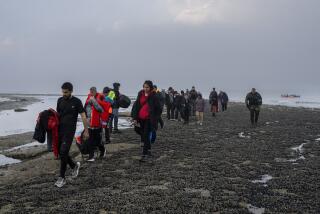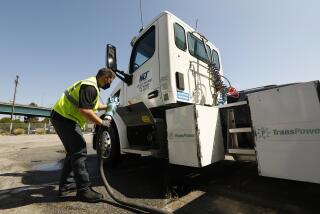Stalled Dreams in Turkey’s Southeast
- Share via
NUSAYBIN, Turkey — Above a stream, past chickens and geese and a muddy cow, sits a poor man’s failed dream.
The truck shone once. But now the 20-ton Ford rusts on the roadside with a flat tire, a busted headlight and a faded pair of leopard skin seat covers. Its owner, Ramazan Kaplan, sits near the truck, clearing his throat and waiting to unfold the story of his life’s biggest gamble.
Kaplan spends his time these days mostly talking; his wife grinds meal and stares for hours across the fields. Kaplan keeps his second-most prized possession close to him: a silver tobacco case. He pulls it from his pocket, wanting to call attention to it, but not wanting to appear so. When the young village men come, he rolls them all a cigarette.
They’ve heard his words many times, but even repeated tales are welcome diversions on the vast plains skirting the Iraqi border. He is still trying to figure out how he got tangled in and then crushed by the complicated -- he would say sinister -- events of geopolitics.
“Everyone was making money,” he said. “We all thought this was our chance.
“I sold the house of my sons to buy this truck,” Kaplan said. “I paid $5,000 for it. It was everything we had. This truck was going to make our lives better. Things are worse. I owe taxes, but if the tax man ever comes, he can have the truck. It ruined us.”
His is one of tens of thousands of trucks abandoned or sold for scrap in southeastern Turkey. Such losses have devastated the economy for the region’s majority population of 13 million Kurds. Throughout the late 1990s, legions of trucks hauled food and clothes into Iraq and returned with diesel bought from Turkey’s nemesis, the Iraqi Kurds, who collected hundreds of millions of dollars in marked-up prices and truck taxes.
The Turks tolerated this because one Iraqi Kurd leader, Massoud Barzani, quietly helped the Turkish military in its campaign against Turkey’s own Kurdish rebels in the Kurdistan Workers Party, or PKK.
A 15-year war between Turkey and the separatists claimed an estimated 37,000 lives and displaced 500,000 people.
In 1999, however, Barzani lost his cachet with Turkey when PKK leader Abdullah Ocalan was arrested and the rebels called a cease-fire.
Fearful that a continued oil trade would give Iraq’s 3.5 million Kurds the resources to form an independent state and destabilize the region, Turkey curtailed the diesel deals, officially stopping them Sept. 1.
The government of Prime Minister Bulent Ecevit announced that the smuggling was costing the Turkish economy millions of dollars a month. Turkey now ships in only crude oil supplied by Saddam Hussein’s regime under the United Nations “oil-for-food” program.
The squeeze on cross-border traffic forced 90% of southeastern Turkey’s 51,000 registered trucks off the fabled Silk Road. Most are not equipped to haul crude oil. Their departure costs the southeast’s economy about $60 million a month. More than 100,000 jobs disappeared, and Kurds again turned bitter against the Turkish government, which has stifled freedom of expression and other rights for its largest minority.
“The Turks just want to keep us hungry,” said Kaplan, the patriarch in a family of 15. “They never want to see a Kurd get ahead. They want to break us down so much that if they’d come and ask for our wives, we’d turn them over.”
This landscape is haunted by truck graveyards.
Rusted metal and chipped paint spoil the vista of brown mountains tapering into cotton and wheat fields. Broken chassis are silhouetted in the dusk as old men gather their goats and women, laden with vegetable sacks and toddlers, trundle past the minarets and bullet-pocked houses of a tormented land. The Muslim call to prayer warbles through scavenged truck cabs; wild dogs sleep on hoods.
The restaurants, and then the gas stations, closed.
“There are no trucks anymore,” said Mehmet Sirin, a lonely attendant with weeds growing around his gas pumps. “Business is down 80%. Some drivers are picking cotton, others have gone to west Turkey to look for work. I’m bored.”
“You have to figure,” said Bedrettin Karaboga, president of the Southeast Industrialists and Businessmen’s Assn., “that each truck had a family of seven or eight relying on it. That means hundreds of thousands of people are suffering. I had to cut my employees from 850 to 300. It’s tiring to live like this. We are like Africa.”
The truck stop near Nezirhan is still open.
No one inside is happy, though. Faces weathered, hands knotted and nicked, the truckers hunch over kebabs and bean soup, comparing miles with profits and getting depressed. Before the border restrictions, truckers would drop off a load of onions or flour in Iraq and return with a load of diesel that was bought just across the border. Most drivers cleared $200 for a 15-day trip, a small fortune in a region that pays its cotton pickers $2.50 for a 12-hour shift.
The few truckers equipped to haul crude oil say their profits have fallen to $35 for a 1,250-mile round trip stretching from the Iraqi border to the Mediterranean Sea.
“Three partners and I sold our sheep and goats and our land to buy this truck,” said Ahmet Dilek, brushing dust off his greasy sweater. “We thought we’d make good money. But we’re all surviving on the fieldworkers and goat herders in our families. I’ve been on the road five months. I don’t have enough money to return home with.”
“How can you go home with no money in your pocket?” said his buddy, Zeki Perisan. “I have eight children. One of them is a shepherd, another works construction in Istanbul. He sends money home.”
Someone asks about the talk of another war in Iraq.
“If there is one, we’re finished,” Perisan said.
“True,” Dilek said.
“Turkey doesn’t want Kurds here to make a profit,” said Ahmet Cetin, who had been eavesdropping on the conversation. “They think the money we make we give to the PKK rebels.
“They think we’re all potential terrorists. I sold my village land and bought a truck. I paid $4,000 for it, and the other day a guy comes up to me and says, ‘I’ll give you $500 for it so I can crush it for scrap metal.’ ”
Delik and Perisan decided that it was time to leave.
They climbed into their cabs, their trucks creeping across the gravel parking lot to the highway.
They drove past the home of Barzan Orgel, where four trucks with dead engines and unpaid tax bills in the glove boxes sat at the edge of a cotton field. Orgel is used to political intrigue at the Iraqi border. He and his three brothers were doing fine in the 1980s. Then the 1991 Persian Gulf War sealed the border and knocked them out of the trucking business. They sold two trucks for scrap.
Orgel figures that’s what will happen to the four in his yard.
“We’re used to struggle,” he said. “We survived, and we’ll survive again. If the border opens back up, I’ll go buy some more trucks. What else can we do?”
More to Read
Sign up for Essential California
The most important California stories and recommendations in your inbox every morning.
You may occasionally receive promotional content from the Los Angeles Times.











